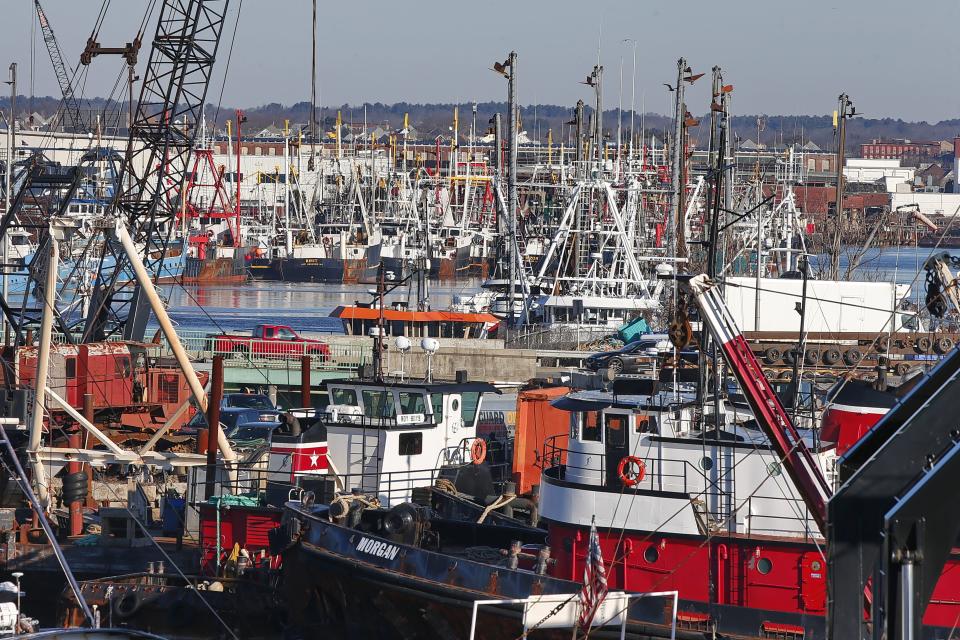Profitable Port of New Bedford draws IRS scrutiny of tax evading fishermen
NEW BEDFORD - The national average for federal tax compliance is 83.6% over every type of industry.
In the commercial fishing industry, that compliance rate drops to 65%, said Joleen Simpson, special agent in charge of the IRS Criminal Investigation, Boston Field Office.
"That's well under the average. So we're really trying to make sure that we have the industry come under compliance," Simpson said.
As the nation's number one commercial fishing port, New Bedford is very much on the radar.
"The statistics we have cover the six New England states but really the fishing industry is significant in Rhode Island, Maine and Massachusetts, with, of course, New Bedford being the most valuable port not only in New England but in the United States," said IRS Criminal Investigation Supervisory Special Agent Matthew Amsden.
"So we can confidentally say the majority of the commercial fishermen impacted here are out of the New Bedford Port," Amsden added.
According to data provided by the National Oceanic and Atmospheric Administration, during the four tax years 2018 to 2021, nearly $1 billion in fishing proceeds to New England crewmembers were reported to the Internal Revenue Service.
During this same period almost 35% of commercial fishing crew members (representing $255 million in proceeds) failed to report this income on their federal tax returns, according to the IRS.
Seven New England fishermen indicted, 3 from New Bedford
Seven New England fishermen, including three from New Bedford and one from Fall River, were charged last month with tax evasion and failing to file returns. The other three indicted were from Rhode Island, according to a press release from the IRS Criminal Investigation unit.
Symbiotic relationship: New Bedford's fishing community is working with Vineyard Wind. Here's how.
They were indicted by federal grand juries in Boston and Providence. They are presumed innocent until proven guilty beyond a reasonable doubt.

According to the indictments, the commercial fishermen each worked for fishing companies operating primarily out of New Bedford, or Point Judith, R.I.
They were paid as independent contractors with their employers filing 1099 forms with the IRS documenting their income.
They included:
Jorge Cazarin of New Bedford, who was charged with five counts of tax evasion and five counts of willful failure to file tax returns for 2016 through 2020.
According to the indictment, Cazarin worked as a commercial fisherman and deckhand for various companies, primarily out of Point Judith in Narragansett, R.I.
From about 2013 through about 2020, Cazarin attempted to evade income taxes due and owing on approximately $1.2 million in income he received as a commercial fisherman, according to the indictment.
Rodolfo Membreno of Fall River, who was charged with six counts of tax evasion for 2012 and 2017 through 2021 and four counts of willful failure to file tax returns for 2017 through 2019 and 2021.
From about 2013 through 2021, Membreno attempted to evade income taxes due and owing on approximately $1.4 million in income he received as a commercial fisherman, according to the indictment.
John Doe of New Bedford, who was charged with six counts of tax evasion for 2016 through 2021 and three counts of willful failure to file tax returns for 2016 through 2018.
From about 2012 through 2021, Doe attempted to evade income taxes due and owing on approximately $1.9 million in income he received, according to the indictment. Simpson declined to comment as to why an alias was used in the indictment because the case is pending.
According to a U.S. Dept. of Justice press release, "One of the defendants allegedly also used the name and Social Security number of another individual to conduct business as a further effort to hide income."
Miguel Cruz Rubio of New Bedford, and Elizabethtown, N.C., who was charged with four counts of tax evasion for 2016 through 2019.
From about 2015 through 2020 Cruz Rubio attempted to evade income taxes due and owing on approximately $1 million in income he received as a commercial fisherman between 2010 and 2019, according to the indictment.
If convicted, each defendant faces a maximum sentence of five years in prison for each evasion count and one year in prison for each failure to file a tax return charge.

Priority to investigate high-income, non-filers
Generally speaking, Simpson said, the indicted individuals are considered to be "high-income, non-filers" with some form of affirmative act to avoid detection.
Simpson stated, “Congress has made it a priority to investigate instances of high income, non-filers. That is, individuals with significant taxable income who either fail to file tax returns or fail to report significant portions of that income from their federal tax returns. The New England commercial fishing industry lands squarely within this directive as many of the identified commercial fishermen are earning between $150,000 to $250,000 annually."
IRS offers 'voluntary disclosure' program
She added the IRS does offer a "Voluntary Disclosure Practice."
"If you have willfully failed to comply with tax or tax-related obligations, submitting a voluntary disclosure may be a means to resolve your non-compliance and limit exposure to criminal prosecution. A voluntary disclosure does not guarantee immunity from prosecution; however, a voluntary disclosure may result in prosecution not being recommended," according to the IRS.
Simpson said it's something for people in these situations to consider before it's too late. "The last thing anybody wants is for one of our agents to come knocking on their door."
"We're hoping that with this message compliance goes up, but we will continue to be active in looking for cases that are within our jurisdiction in this industry," Amsden said.
Asked if more indictments could be on the way, Amsden replied, "I would say our work in this industry is not complete."
This article originally appeared on Standard-Times: Commercial fishing's low tax-compliance rate draws IRS to New Bedford

